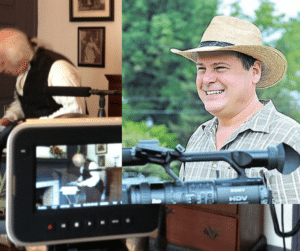Hope Stewart of Four Rivers recently talked with Mark Hildebrand of Make Your Mark Media about his documentary projects, the new Annapolis history wiki, and how he engages students from AACPS to help tell and preserve the stories of our area’s past.

How did you develop an interest in working on history and heritage related documentaries?
I grew up in Annapolis so have always been aware of history. After all, it’s all around us. But surprisingly enough, it was not my original intention to create historical documentaries. When I decided to become a full-time filmmaker in 2009, I knew I wanted to make films that are both educational and entertaining. When I learned the story of the Star Spangled Banner, and realized how much of the story we thought we knew was wrong, I produced “Anthem: The Story Behind The Star-Spangled Banner.” At its heart, it’s really a Maryland story, so it’s personal to those of us who live here. One of the best parts of making a documentary is putting yourself there, in that moment and at that time. Finding a way to translate past events and make it real to viewers today.
What are some future ideas you have for documentaries?
The best part of being a documentary filmmaker is there are always new stories to be told or further explored. I’d love to showcase the work of our local riverkeepers, feature Carr’s Beach, tell the civil rights history of Annapolis, or take a look at Queen Anne’s legacy in our area.
I’m interested in exploring the lives of Elizabeth Patterson Bonaparte and Jérôme Bonaparte. They visited Annapolis in October 1804, attempting to sail to France for Napoleon’s Coronation. But they met a British blockade in the Chesapeake Bay and had to turn back. They tried again a month later, sailing from Philadelphia. That ended in a shipwreck near Lewes, Deleware.
I’m also working on gathering stories and oral histories as part of the upcoming Eastport 150th celebration. I know Annapolis will never leave me without a topic.
What motivated you to develop Annapolis Past Port?
There was interest in creating an Annapolis history “wiki” back in 2010, but the wikis at that time were cumbersome, and just did not work for the user needs. Fortunately, technology and ease of access have improved in the last seven years. I thought it was important that we get all of our history in one place. People are always telling stories, but now it is time to write those stories down and share them, or to tell the stories that have been told to us. Stories help to humanize history. Plus, we’ll have a repository for photographs, we can store them and share them without causing damage. We have the technological ability, why don’t we do more to help all of us benefit from it?
Tell me about your work with AACPS STEM students on the Annapolis wiki and other history-related projects.
It was important that I started with students who were interested in history. They were already inclined towards using technology to create this great public archive. I asked them to put themselves in the mindset of someone less-inclined towards technology, and figure out how to make the wiki easier and user-friendly for all users. I tried to engage them by having them each create their own page about a history-related topic, something that really resonated with them; for example, one student began collecting examples of Annapolis slang. That’s all part of our cultural history.
I’m also been working with students from AACPS for the Creative Radio for Arts and the Bay (CRAB) radio station (WYZT-LP 104.7 FM). These students are specifically learning about storytelling for radio, how to produce their own shows and develop an engaging narrative. We’re still looking for content for live broadcasts and would love to have more of our local community partners involved!
The keynote speech at the recent Preservation Maryland conference was on the Future of History. How do you think the constant evolution of media technology will affect our relationship with the past?
I think technology will have a very positive impact on our relationship with history because it will make history more real to us. We now have the ability to “recreate” history using technology, to experience the reality of the past. We are a culture that normally tears things down and rebuilds in place, but now with technology, we have the ability to see and know what has gone before, which gives us a greater appreciation of what is, and was, around us.
Interested in learning more about the new Annapolis history wiki? Check out the website at www.mym-media.org/
